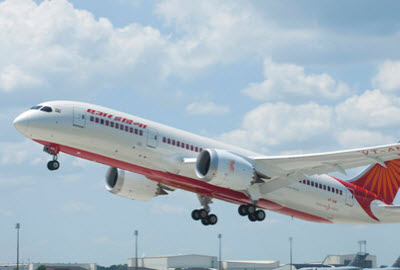Air India in new disability discrimination row
- Written by Roberto Castiglioni
 Beleaguered state-owned carrier Air India policy for transport of disabled people is under scrutiny on allegations of discrimination against the disabled.
Beleaguered state-owned carrier Air India policy for transport of disabled people is under scrutiny on allegations of discrimination against the disabled.
For some odd reason Air India cannot get their disability policy right. On Tuesday, India’s government told parliament the airline makes profits on nine of its 370 daily flights. Due to the dire state of its finances, Air India is now cutting loss-making routes.
As if this wasn’t enough, the airline was once again exposed for its discriminatory policies against the disabled.
On its website the airline states that in order not to violate the civil rights of passengers with disabilities the use of wheelchairs is free at all airports. But passengers travelling to the UAE and other Gulf countries beg to disagree.
Last September the family of a 70-year-old woman had to pay 300 Dirham (GBP 51/Euro 65/USD 81) to have their relative use a wheelchair.
“Air India does not charge its passengers any fee for using wheelchairs or wherever it is handling its own flights,” the airline’s regional manager said.” But in the UAE a third party handles Air India flights, Rajneesh Bagga explained.
dnata is the handling company that give special handling services to Air India and over 140 airlines operating into and out of Dubai  International Airport.
International Airport.
The handling agent said the cost for wheelchair service is 135 Dirham, 165 Dirham less than the amount Air India charges passengers. “Some carriers levy charges for special handling, but dnata does not accept payment from passengers for this service,” a spokesperson for the handling company said.
Air India imposes restrictions on the number of passengers with reduced mobility carried on each flight. Ten wheelchair passengers are accepted on flights operating to/from the west of India and six per flight on flights operating to/from the east of India. The airline says restrictions are imposed the safety of all passengers in case of an emergency evacuation.
Privately-owned Indian carrier Jet Airways also imposes similar restrictions, but limited to unaccompanied immobile passengers (WCHC). Restrictions vary per type of airplane, ranging from three passengers on Boeing 737s, five on Airbus 330, and seven on Boeing 777s.
On its website Air India ensures passengers with disabilities that enough wheelchairs are available for boarding and disembarking. The white lie hides a much different reality.
Across Europe Air India has the lowest rate of pre-notified request for wheelchair service. On average, six out of ten passengers arrive at destination without having their wheelchair service booked. But the airline tells passenger requiring wheelchair service they must ask for the service at the time of booking their flights and get confirmation before their departure.
The sight of scores of passengers left at the gate waiting for a wheelchair after disembarking Air India flights has become part of the landscape at major European airports.
Actions speak louder than words. Air India’s inefficiencies and discriminatory practices translate into an undignified experience for passengers with disabilities.
Few months after the Minister of Civil Aviation asked airlines and airports to do more for the disabled the behaviours of the state-owned airline undermine India’s government credibility.
Do you need help when travelling by air? Have you recently flown Air India? Send us your comments here or use our contact form










